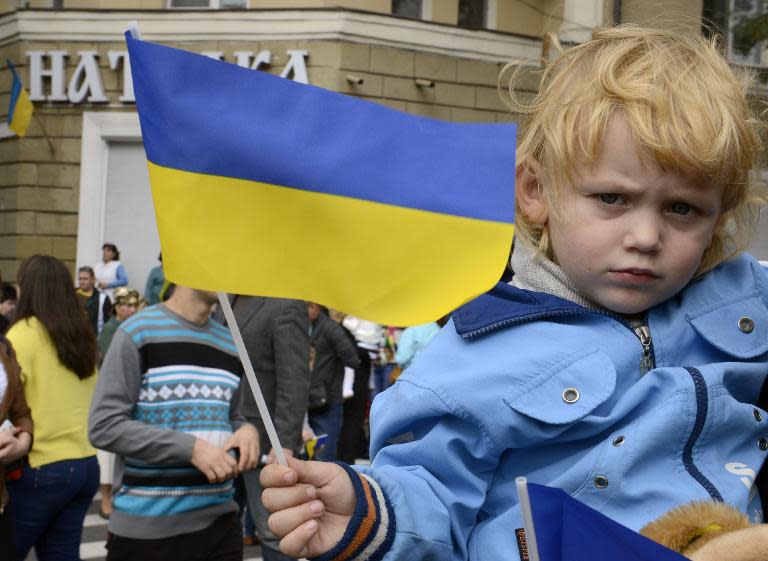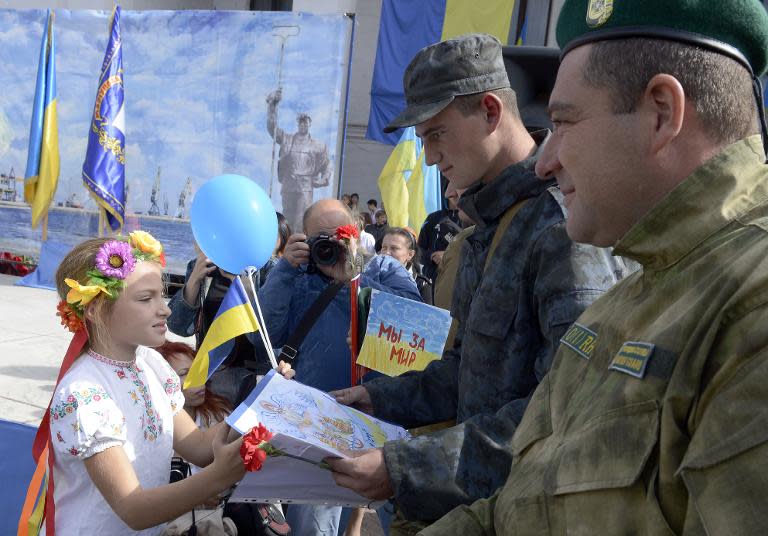Living on Ukraine frontline, trying to make sense of war
From the balcony of his apartment in Mariupol, a strategic city in the conflict between the Ukraine army and pro-Russian separatists, Piotr Galanji can see the frontline. Galanji, who proudly served in the Soviet Red Army for 27 years, has no wish to choose sides at his age -- a sprightly 67. His crumbling dormitory town on the banks of the Sea of Azov lies some half a kilometre (a quarter mile) from the last fortified checkpoint of Kiev's soldiers. In defiance of a ceasefire, separatists fired shells overnight Sunday that landed in the field below his windows. If the separatists capture Mariupol they will be able to advance along the coast of the Azov towards Crimea, which Russia annexed in March, with a view to creating a corridor to rebel-held eastern Ukraine. "I was in the Soviet Army in Germany, in Ukraine, at Murmansk (in the far northwest of Russia), in Siberia. In 1968, I fought in Czechoslovakia... And this is how Russia thanks me?" asks the septuagenarian with glistening eyes. "I would never have imagined such a thing." Along with two friends, Galanji gazes at the Ukrainian position, which the men say is frequently targeted. There, a tank is set against an embankment, and positions have been dug out and reinforced. The soldiers are nervous and refuse to answer questions. "The other day a comrade from the Red Army telephoned me from Russia to ask me my news," Galanji said. "He heard gunfire over the phone. I told him my house is on the frontline. He said Russian television said Mariupol was full of fascists. Me, a fascist?" he asked, aghast. - 'It's my country' - "My children have invited me to stay with them, but I won't leave here. It's my country. I'm not afraid of dying. I've had a good life," the veteran smiles. His friend Olander Savrukin, 54, points to the road below: "You see that, it's a target. Since I live on the 10th floor I see everything. First they fire a few rounds, to adjust their sights. Then the rockets rain down in bunches. Mounds of earth fly into the air." Like many Mariupol residents, Anatoly Fedoriak, 32, works in one of the city's two giant steel factories. When he moves about in the town, he skirts the walls of the buildings. "The Russians are aiming at the checkpoint, but luckily so far (the rockets) are falling in the fields. No building has been hit." Like many residents, he feels stuck in Mariupol. "I don't know where we would escape to. I have a four-month-old baby. There are cellars, but no one has the keys." The neighbouring village of Primorsk, near the Sea of Azov's grey beaches, is also on the frontline. Sheltering behind sandbags, a Ukrainian officer says his position was targeted at dawn on Monday. "The OSCE observers came this morning and we showed them the impact marks. They (the separatists) fired mortar shells on us." Asked whether he responded, the officer shrugged his shoulders and smiled. Some 200 metres (yards) away, 42-year-old Olga lives in a house in the zone separating the warring sides and says she has been without power for a week. "The firing started last evening," she said. "It's terrible to live here on the frontline. It's scary. This morning it lasted half an hour. But where can we go?"




